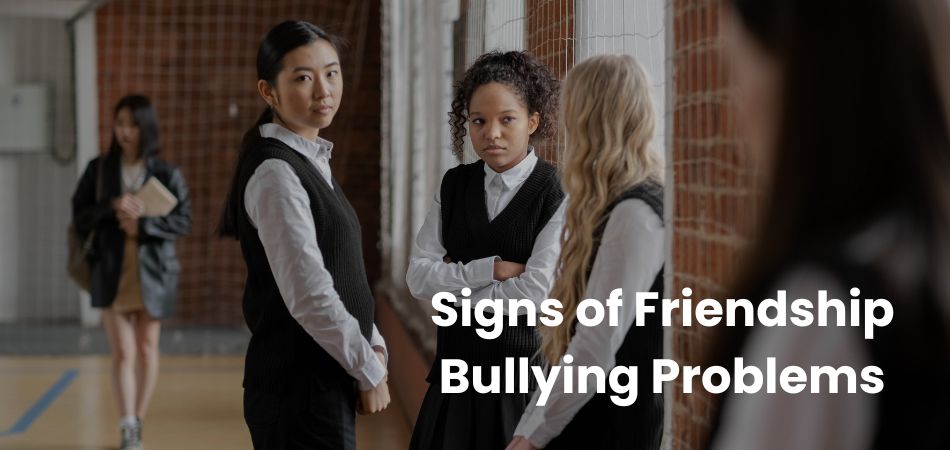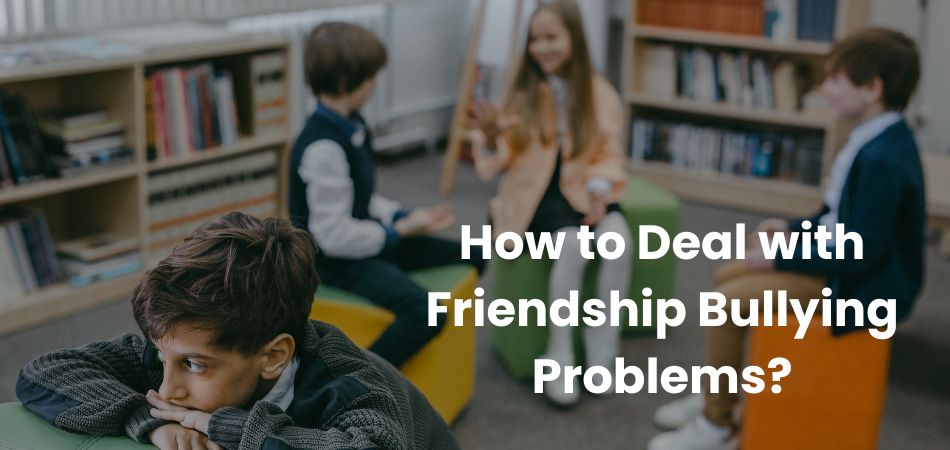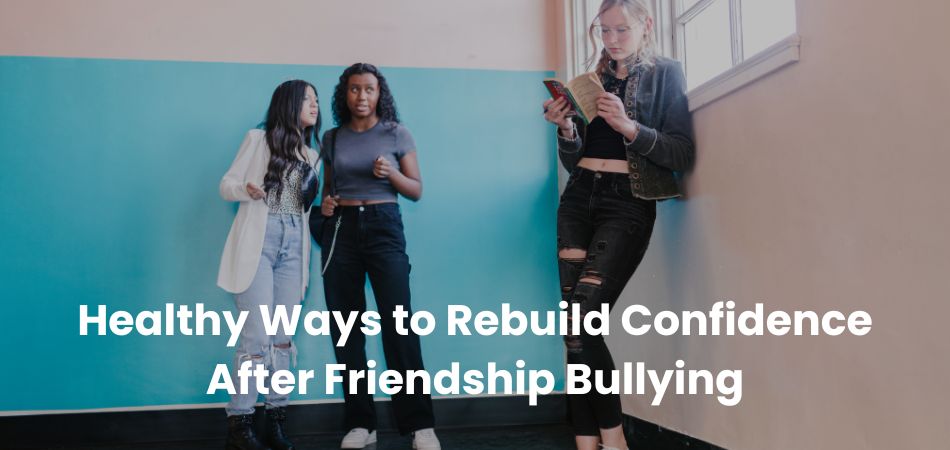Friendships are meant to be a source of support, joy, and companionship. However, when a friendship turns sour and becomes a source of hurt, it can be deeply confusing and painful. Learning how to deal with friendship bullying problems is crucial for maintaining your emotional well-being and building healthier relationships.
To deal with friendship bullying, recognize harmful patterns early, set clear boundaries, communicate openly, seek support from trusted individuals, prioritize self-care, consider professional help if needed, and be prepared to end toxic relationships.
In this blog post, we’ll explore practical strategies to recognize and address these issues, helping you regain confidence and build positive connections.
What Are the Signs of Friendship Bullying Problems?
Friendship bullying can be subtle, making it difficult to identify at first. Unlike traditional bullying, it often involves manipulative or emotionally abusive behavior within the context of a close relationship. The following are signs of friendship bullying:

Frequent Exclusion from Activities
Being consistently left out of plans or gatherings is a common sign of friendship bullying. If a friend repeatedly excludes you while including others, it may indicate intentional manipulation. This behavior can leave you feeling isolated and undervalued.
Passive-Aggressive Communication
Friendship bullying often manifests through indirect or sarcastic comments that belittle or mock you. These remarks may seem playful on the surface but carry an undercurrent of negativity. Over time, this behavior can erode your self-esteem and make you feel disrespected.
Emotional Manipulation
A bullying friend may use guilt or emotional blackmail to control your actions. For instance, they might accuse you of not caring enough if you don’t prioritize them over other commitments. Such manipulation creates an unbalanced relationship, leaving you constantly on edge.
Spreading Rumors or Gossip
One of the most hurtful signs is when a supposed friend spreads false or harmful rumors about you. This betrayal of trust not only damages your reputation but also creates tension within your social circle. It’s a clear indicator of toxic behavior in the friendship.
Excessive Criticism or Judgment
A friend who constantly criticizes your choices, appearance, or actions may be engaging in bullying behavior. While constructive feedback is normal, persistent negativity can make you doubt yourself. This dynamic often leaves you feeling unsupported and undervalued.
Why Do Friendship Bullying Problems Occur in Close Relationships?
When friendship bullying occurs within relationships where trust and support are expected, it can be especially painful. Addressing the root causes and cultivating healthier interactions begins with understanding why these problems arise. The following are some reasons friendship bullying occurs in close relationships:
Insecurity and Jealousy
Friendship bullying often arises when one person feels insecure or jealous of the other’s achievements, relationships, or qualities. They may resort to belittling or undermining their friend as a way to compensate for their own feelings of inadequacy. This behavior is an attempt to restore a sense of control or superiority.
Desire for Power and Control
In some cases, one friend may bully another to establish dominance in the relationship. This power dynamic allows the bully to feel more significant or validated. Unfortunately, it creates a toxic imbalance, leaving the other person feeling oppressed or undervalued.
Unresolved Personal Issues
Friendship bullying can be a reflection of unresolved personal struggles, such as low self-esteem or emotional trauma. A person dealing with internal challenges might project their frustrations onto a close friend. This misdirected behavior is harmful but often rooted in deeper personal pain.
Fear of Rejection or Abandonment
Some individuals bully their friends as a way to maintain control and prevent rejection. By putting others down or creating dependency, they attempt to ensure that their friends remain loyal. This approach is counterproductive and damages the trust within the friendship.
Negative Group Dynamics
Friendship bullying can also stem from toxic group dynamics, where peer pressure or a desire to fit in leads to harmful behavior. A group might ostracize or target one member to establish unity among the others. This behavior can escalate quickly and harm both individual relationships and the group as a whole.
Differences Between Healthy Conflict and Friendship Bullying
Friendships naturally involve disagreements and challenges, but there’s a distinct difference between healthy conflict and friendship bullying. Healthy conflict is rooted in mutual respect and a desire to resolve issues, while bullying is driven by control, manipulation, or harm. Here are some differences between healthy conflict and friendship bullying:
| Aspect | Healthy Conflict | Friendship Bullying |
| Intent | Resolving misunderstandings and strengthening the bond. | Exerting control, belittling, or causing harm. |
| Communication Style | Open, respectful, and focused on problem-solving. | Sarcastic, passive-aggressive, or overtly hostile. |
| Frequency | Occasional and situational, arising naturally. | Persistent and repetitive, targeting the same person. |
| Emotional Impact | Leaves both parties feeling understood and valued. | Creates feelings of sadness, insecurity, or isolation. |
| Outcome | Strengthens trust and improves the relationship. | Weakens trust and damages the friendship. |
How to Deal with Friendship Bullying Problems?
Bullying in friendships can be draining and challenging, especially when the relationship is important to you. Addressing the problem requires a balance of self-awareness, communication, and action. Here are some strategies to help you deal with friendship bullying effectively and regain control of your emotional well-being.

1. Recognize the Signs Early
The first step in dealing with friendship bullying is identifying when the behavior crosses the line. Pay attention to patterns of manipulation, exclusion, or criticism that leave you feeling undervalued. Acknowledging these signs helps you understand the root of the issue. Early recognition allows you to take steps before the situation worsens.
2. Set Clear Boundaries
Establishing boundaries is crucial when dealing with a bullying friend. Be firm about what behavior is acceptable and what isn’t, and communicate this clearly. For example, let them know you won’t tolerate passive-aggressive comments or exclusion. Boundaries help protect your emotional health and clarify your expectations for the friendship.
3. Communicate Your Feelings
Open and honest communication is essential in addressing bullying behavior. Share your feelings with your friend in a calm and non-confrontational manner. Use “I” statements, such as “I feel hurt when you exclude me,” to express yourself without assigning blame. This approach encourages understanding and reduces defensiveness.
4. Seek Support from Trusted Individuals
If you’re struggling to handle the situation alone, talk to someone you trust, like a family member, teacher, or close friend. Their perspective can help you gain clarity and provide emotional support. They may also offer guidance on how to address the problem effectively. You don’t have to face bullying alone, and seeking support is a sign of strength.
5. Focus on Self-Care
Friendship bullying can take a toll on your mental and emotional health, so prioritizing self-care is essential. Engage in activities that make you feel happy and relaxed, such as hobbies, exercise, or spending time with supportive friends. Practice mindfulness to reduce stress and regain balance. Self-care helps you rebuild your confidence and resilience.
6. Consider Professional Help if Needed
If the bullying persists or deeply affects your emotional well-being, consider seeking professional guidance. Therapists or counselors can provide strategies to navigate toxic relationships, cope with the emotional impact, and address issues like punishments for cyberbullying. They can also help you strengthen your communication and boundary-setting skills. Professional support is invaluable in difficult situations.
7. Be Prepared to End the Friendship
Sometimes, despite your best efforts, the friendship may remain toxic. If your attempts to address the bullying fail and the behavior continues, it’s okay to walk away. Ending a friendship can be difficult, but your emotional health and happiness should come first. Surround yourself with people who value and respect you.
Healthy Ways to Rebuild Confidence After Friendship Bullying
Experiencing friendship bullying can leave you feeling insecure and questioning your self-worth. Rebuilding confidence takes time and effort, but is essential for emotional recovery and developing healthier relationships. Here are some practical and healthy ways to regain your confidence and strengthen your sense of self.

1. Acknowledge and Validate Your Feelings
Start by recognizing the emotions you’ve experienced during and after the bullying. Allow yourself to feel anger, sadness, or frustration without judgment, as these are valid responses to a hurtful situation. Acknowledging your feelings is the first step toward processing them and moving forward.
2. Surround Yourself with Supportive People
Rebuilding confidence is easier when you’re surrounded by people who uplift and encourage you. Spend time with friends and family members who genuinely care about you and appreciate your qualities. Their positivity and support can help you see your worth and rebuild your trust in relationships.
3. Focus on Your Strengths and Accomplishments
Remind yourself of your unique skills, talents, and past achievements. Make a list of things you’re proud of or qualities that make you special. Reflecting on these strengths can help you shift your focus away from the negativity of the bullying experience.
4. Engage in Activities That Bring You Joy
Participating in activities you love can help you reconnect with yourself and rebuild your self-esteem. Whether it’s a creative hobby, physical exercise, or volunteering, these activities remind you of your capabilities and bring positivity into your life. Joyful experiences can counteract the emotional weight of bullying.
5. Practice Positive Self-Talk
Replace negative thoughts with affirmations and kind words to yourself. Remind yourself daily that you deserve respect and love, and that bullying does not define your worth. Over time, positive self-talk can reshape your inner dialogue and boost your confidence.
When Should You Consider Ending a Toxic Friendship?
Ending a toxic friendship is never an easy decision, but there are times when it’s the healthiest choice. If a friend’s behavior consistently makes you feel hurt, undervalued, or manipulated, it may be time to reassess the relationship. Trust your instincts—if their actions leave you drained instead of uplifted, it’s a sign that the friendship may no longer serve your well-being.
Consider ending the friendship if attempts to address issues and set boundaries fail. Communication is key, but when the other person refuses to acknowledge or change harmful behavior, it shows a lack of respect for your needs. Toxic friendships often involve one-sided dynamics where your feelings and efforts aren’t reciprocated. If the relationship causes more harm than joy, walking away is a form of self-care.
Prioritizing your mental and emotional health should guide your decision. Surrounding yourself with supportive, respectful people leads to growth and positivity. Ending a toxic friendship creates space for healthier, more fulfilling relationships.
FAQs About Friendship Bullying Problems
Friendship bullying can be a confusing and emotionally charged experience, leading to many questions about how to recognize, address, and recover from it. You can make informed decisions about your relationships if you know the nuances of these situations. Here are some frequently asked questions about friendship bullying problems, along with concise answers.
1. What Should I Do If a Friend Humiliates Me in Public?
If a friend humiliates you in public, try to remain calm and avoid reacting impulsively. Address the situation privately later, expressing how their behavior made you feel. If the behavior persists, reevaluate whether the friendship is truly supportive and respectful.
2. Can Friendship Bullying Happen in Adult Relationships?
Yes, friendship bullying can occur at any age, including in adult relationships. Adults may experience manipulation, gossip, or exclusion in social or professional settings. Recognizing these behaviors and setting boundaries is essential to maintaining healthy relationships.
3. Is It Normal to Feel Guilty About Ending a Friendship?
Feeling guilty after ending a friendship is normal, especially if the relationship once meant a lot to you. Remind yourself that prioritizing your well-being is not selfish, and sometimes letting go is necessary. Over time, the guilt will lessen as you focus on healthier connections.
4. How Can I Teach My Child About Healthy Friendships?
Encourage open communication with your child about their friendships and guide them to recognize respectful behavior. Teach them to set boundaries and stand up for themselves if a friend acts unkindly. Modeling healthy relationships in your own life reinforces these lessons.
5. Are There Warning Signs of Friendship Bullying Before It Becomes Severe?
Subtle warning signs include frequent sarcasm, exclusion from plans, or feeling belittled after interactions. These behaviors may escalate over time if not addressed. Recognizing early signs can help you take steps to protect yourself and address the issue constructively.
Final Notes
Dealing with friendship bullying can be challenging, but it’s an opportunity to prioritize your emotional well-being and build healthier relationships. Learning how to deal with friendship bullying problems empowers you to recognize harmful behaviors, set boundaries, and take proactive steps to protect yourself.
Whether it involves open communication, seeking support, or even ending toxic friendships, these actions pave the way for stronger and more fulfilling connections. Remember, you deserve relationships that are built on respect and kindness. By addressing bullying effectively, you create space for positivity and growth, allowing you to thrive in friendships that truly uplift and support you.
